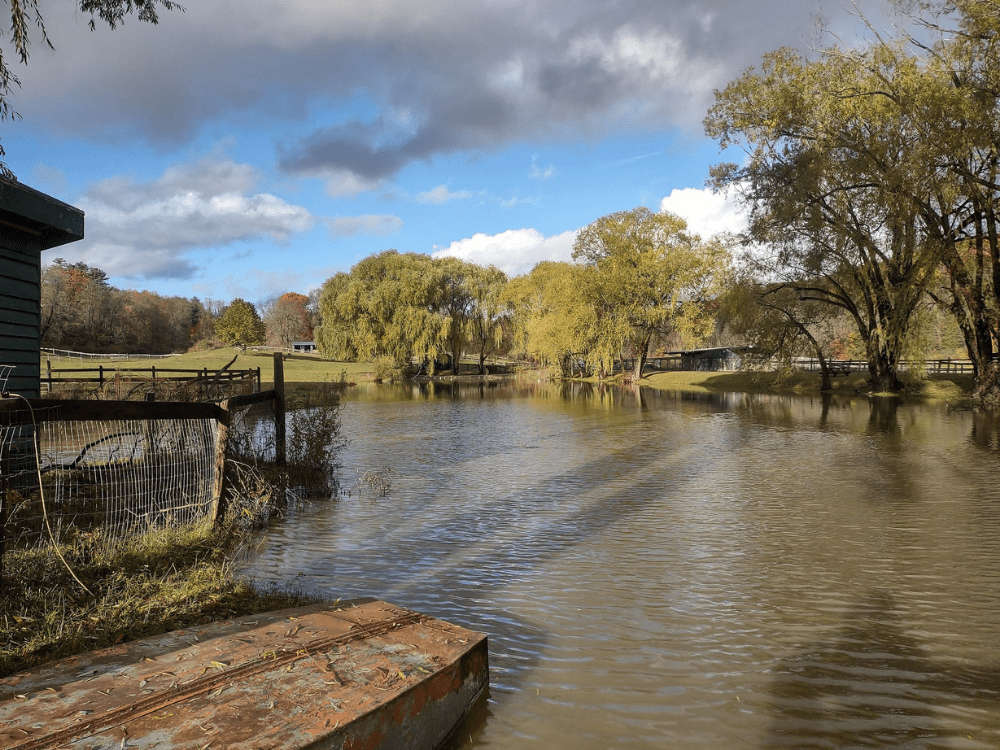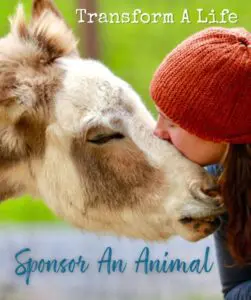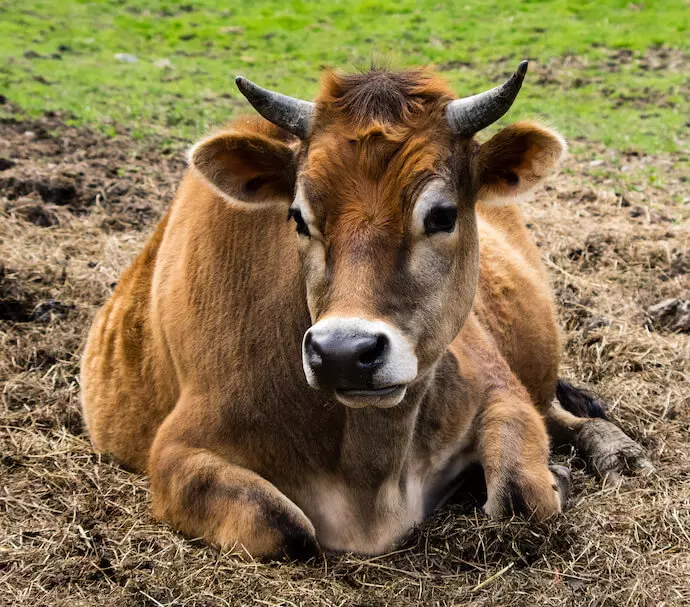
An Open Letter From Catskill Animal Sanctuary: We’re Seeing Climate Change At Home
At Catskill Animal Sanctuary, we’ve been deeply connected to the 150 acres that comprise our home for the past 21 years: warm pastures where contented cows sunbathe, ponds where ducks swim for hours, fields for horses to run and roll in, and graceful willows dipping their branches low for goats to nibble on.
Each year, Earth Day invites us all to reflect on our relationship to the land — particularly as we see the impact of human hands on our beloved planet. And at Catskill Animal Sanctuary, the evidence is all around us.
Our Vanishing Trees
The consequences of climate change are being felt across the globe, with climate refugees (often already vulnerable people) at the forefront of this emergency. But though we are more geographically fortunate than many, we too are experiencing changes at our Hudson Valley refuge that can’t be chalked up to the vicissitudes of “weather.”
As the planet warms, microbursts, which can cause devastating damage, are increasing in frequency — last year alone, the Sanctuary lost 22 trees in a single microburst. In February, we survived an “Armageddon-like” ice storm, which downed dozens of trees and tore off large limbs. Its force damaged fences, vehicles, and a small barn. Many large branches dangled by a thread, threatening the safety of humans and animals.
The loss of our trees — and their root systems — along with torrential rainfall, has led to dramatic topsoil erosion. The erosion further imperils our trees as their roots are exposed, and also leads to the loss of vital grazing in our pastures. Two of our larger pastures, in fact, are no longer safe for our larger and more elderly animals due to wide swaths of rock face that just a few years ago were covered in soil and grass. Finally, as we lose more trees, we lose vital shade. Our soil health deteriorates further.
The Most Dangerous Idea
One of the most dangerous ideas still touted by a tiny but vocal minority is that climate change is “fake,” driven by a political agenda. But facts have no party affiliation. Rising sea levels, extreme weather events, water scarcity, wildlife habitat loss, and global food scarcity are all indifferent to our beliefs, our emotions, and our political affiliations. And as the fate of the planet and our very existence upon it is at stake, our thoughts and hearts turn to what we can do — as an organization and as individuals — to build a livable future before it’s simply too late.
It’s clear that neither corporations nor politicians lack the will to take bold action: one group is too driven by the bottom line; the other is too beholden to the first group. So, as has been the case with every other social change movement throughout history, it is up to us— one person, one household, one community at a time— to make changes that will then drive corporate and political power to act. And we must make those changes now. The most recent report from the UN’s Intergovernmental Panel on Climate Change issued a “Code Red” for the planet, laying out why bold and urgent action is imperative.
What, Then, Can We Do?
A recent climate study showed that a global shift to a plant-based food system over the course of 15 years would “substantially alter the trajectory of global warming,” With animal agriculture one of the leading contributors* to global greenhouse gas emissions, this shift could help balance out emissions from other sectors, like transportation. Allowing land to rewild, rather than using over a quarter of the Earth’s surface merely for grazing “food animals,” would create vital “carbon sinks” which would tangibly reduce the amount of carbon entering the atmosphere. Since growing animals to feed humans is a massive contributor to greenhouse gas emissions— a root cause of the warming of our planet that causes climate change— this shift is vital. It is urgent. And it needs you.
By changing what we put on our plates at breakfast, lunch and dinner, you and I can make a difference. Reducing or eliminating our consumption of animal products is a powerful action that each of us can take— one that, if enough of us take it, will be a fulcrum that moves the world. While it may seem daunting, we can make this shift: we know, because we’ve helped thousands of folks on their vegan journey for decades, including the ones who say, “But I could never go vegan!” or “I can never give up cheese!” Our culinary program, Compassionate Cuisine, has won awards for demonstrating how accessible and delicious vegan food can be. Our humane education program changes lives by introducing farmed animals to visitors (both in-person and virtually) and sharing their heart-opening stories. Sometimes, the humans step back and allow the animals to work their magic on unsuspecting guests. Epiphanies happen at farmed animal sanctuaries.
Mend What Is Within Your Reach
Dr. Clarissa Pinkola Estés writes: “Ours is not the task of fixing the entire world at once, but of stretching out to mend the part of the world that is within our reach.” Today, tomorrow, and as long as you can, mend what is within your reach.
*Note: Find out more about how and why this estimate shifts on our Earth Week episode of Herd Around The Barn.
What Can You Do Today?
Go Vegan – visit bit.ly/cas-earthday-2022 for a free recipe booklet
Share This Article
Fall in love with farmed animals – Visit The Sanctuary In Person Or Virtually!
Love Spoken Here, Sanctuary Life
Tagsanimal agriculture, animal sanctuary, climate, climate change, climate refugee, climate sink, earth day, earth day 2022, erosion, global warming, greenhouse gases, Hudson Valley, microburst, pollution, root systems, vegan for earth day, vegan for the planet







I just want to thank you for everything you do … the sanctuary, the phenomenal ‘Herd Around the Barn’ podcast (the Earth Day episode was so, so good) … every single thing you do on behalf of animals and the entire planet! You are so inspiring and appreciated.
Hi Kelly, thanks so much for the support! We’re grateful to have you in our Herd! Love from the whole CAS team